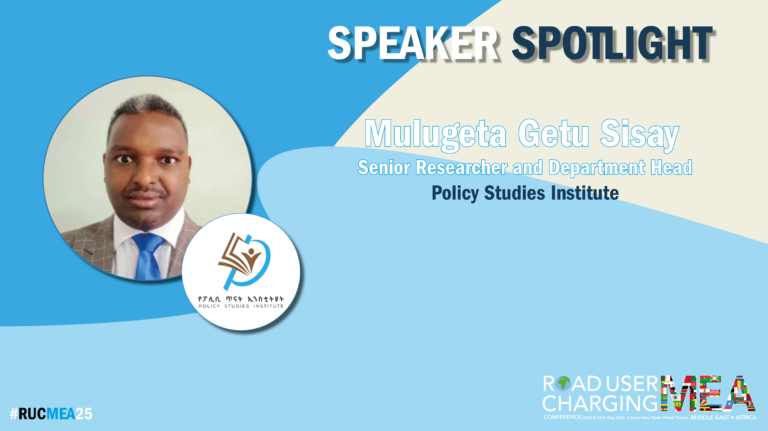As Road User Charging Conference Middle East & Africa (MEA) 2025 approaches, CiTTi Magazine profiles the experts confirmed to speak at the internationally renowned event.
Taking place on 28-29 May in Abu Dhabi, United Arab Emirates, the annual Road User Charging Conference MEA will examine the latest advancements in user-financed transport infrastructure.
This prestigious two-day conference brings together policymakers, industry leaders and innovators to share best practices in the planning, financing, implementation and operation of tolling, road usage charging and mobility pricing schemes across highways, urban roads and cross-border corridors.
Among the confirmed speakers is Mulugeta Getu Sisay, senior researcher and department head at the Policies Studies Institute, Ethiopia
Sisay is a lawyer from Ethiopia and holds PhD from Cardiff University with research on regulatory instruments and the nexus between environment and sustainable development.
He has 17 years of teaching, research, and project management experiences with Ethiopia, Cardiff University, UNHabitat (Ethiopia) and Ethiopia Policy Study Institute in the areas of governance and institutions, transport mitigation, economic laws, land rights and social justice.
Currently, Sisay serves as a senior researcher and department head at the Ethiopian Policy Studies Institute (PSI), a government-affiliated think-tank with 23 years of experience in policy research.
At the event, Sisay will discuss the equity concerns of toll roads in Ethiopia and how transport infrastructure investment could focus on enhancing inclusivity and offering modal choices for low-income groups.
His presentation will also delve into how road pricing schemes may consider measures like dynamic tolls, discounts, and subsidies to mitigate the financial impact on low-income users.
 Name: Mulugeta Sisay
Name: Mulugeta Sisay
Job Role: Senior Researcher and Department Head
Organisation: Policies Studies Institute
What is the most rewarding aspect of your role?
The most rewarding aspect of my work is the ability to contribute to evidence-based policymaking that has a direct impact on improving societal outcomes. I value the opportunity to engage with diverse stakeholders, to develop policies that promote inclusive and sustainable development, and encourage responsive governance.
What is the most pressing challenge for user-financed transportation in 2025?
The primary challenge lies in ensuring that user-financed transportation mechanisms do not deepen existing social inequalities and are able to expedite transport de-carbonisation. Striking the right balance between generating necessary revenue and maintaining affordability for low-income and vulnerable populations while also mitigation transport emissions remains a critical concern.
What is your best piece of advice for those implementing user-financed transport schemes?
It is essential to undertake comprehensive impact assessments to understand the full implications of pricing strategies and the policy goals it intends to achieve. Equally important is the integration of mitigation measures and alternative provisions to protect and support low-income groups and vulnerable segments of society.
Does legislation support or hinder innovation in this sector?
Legislation, when designed to be consultative, adaptive, and forward-looking, significantly supports the development of user-financed transportation systems. However, overly restrictive legal frameworks can hinder innovation and limit the participation of dynamic private sector actors.
How will user-financed transportation schemes evolve by 2030?
By 2030, I anticipate that user-financed transportation will become increasingly shaped by private sector engagement, digital transformation, and innovative public-private partnerships. These developments will help address fiscal constraints while enhancing the accessibility and efficiency of transport services. In the road transport, the enhanced penetration of electric vehicles would change the nature and amenities of transport infrastructure and its integration with other services such as energy, telecom, AI.
Why are you looking forward to speaking at Road User Charging Conference MEA 2025?
I look forward to exchanging knowledge with peers from across the Middle East and Africa, gaining insights into innovative practices and technologies in user-financed transportation. The conference presents a valuable opportunity to foster new partnerships and ensure that our policies remain aligned with global advancements. I also look forward to gaining insights into how others have balanced financial sustainability with equity considerations in user-financed transport, and the outcomes they have achieved.
Discover the key trends and challenges shaping the future of user-financed transportation –spanning tolling, pricing and road usage charging – at Akabo Media’s global Road User Charging Conference series. Join senior decision-makers from around the world as they tackle the issues defining the industry in Brussels (March 2025), Abu Dhabi (May 2025), Miami (September 2025), and Singapore (October 2025). Gain invaluable insights, share innovative ideas and network with global leaders driving the transformation of transportation systems. Click here to learn more and secure your place!





